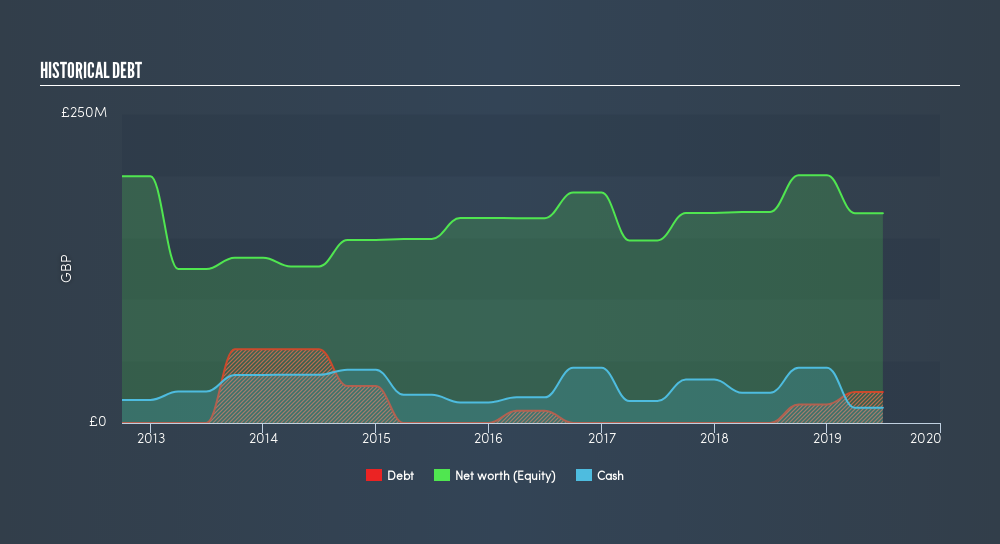Moneysupermarket.com Group (LON:MONY) Could Easily Take On More Debt

The external fund manager backed by Berkshire Hathaway's Charlie Munger, Li Lu, makes no bones about it when he says 'The biggest investment risk is not the volatility of prices, but whether you will suffer a permanent loss of capital.' So it might be obvious that you need to consider debt, when you think about how risky any given stock is, because too much debt can sink a company. We note that Moneysupermarket.com Group PLC (LON:MONY) does have debt on its balance sheet. But is this debt a concern to shareholders?
When Is Debt A Problem?
Debt is a tool to help businesses grow, but if a business is incapable of paying off its lenders, then it exists at their mercy. In the worst case scenario, a company can go bankrupt if it cannot pay its creditors. However, a more usual (but still expensive) situation is where a company must dilute shareholders at a cheap share price simply to get debt under control. Of course, debt can be an important tool in businesses, particularly capital heavy businesses. When we think about a company's use of debt, we first look at cash and debt together.
View our latest analysis for Moneysupermarket.com Group
What Is Moneysupermarket.com Group's Net Debt?
The image below, which you can click on for greater detail, shows that at June 2019 Moneysupermarket.com Group had debt of UK£25.0m, up from none in one year. However, it does have UK£12.4m in cash offsetting this, leading to net debt of about UK£12.6m.

How Healthy Is Moneysupermarket.com Group's Balance Sheet?
Zooming in on the latest balance sheet data, we can see that Moneysupermarket.com Group had liabilities of UK£93.8m due within 12 months and liabilities of UK£43.7m due beyond that. On the other hand, it had cash of UK£12.4m and UK£53.8m worth of receivables due within a year. So its liabilities total UK£71.3m more than the combination of its cash and short-term receivables.
Since publicly traded Moneysupermarket.com Group shares are worth a total of UK£1.91b, it seems unlikely that this level of liabilities would be a major threat. But there are sufficient liabilities that we would certainly recommend shareholders continue to monitor the balance sheet, going forward. Carrying virtually no net debt, Moneysupermarket.com Group has a very light debt load indeed.
In order to size up a company's debt relative to its earnings, we calculate its net debt divided by its earnings before interest, tax, depreciation, and amortization (EBITDA) and its earnings before interest and tax (EBIT) divided by its interest expense (its interest cover). Thus we consider debt relative to earnings both with and without depreciation and amortization expenses.
Moneysupermarket.com Group has a low net debt to EBITDA ratio of only 0.10. And its EBIT easily covers its interest expense, being 80.7 times the size. So we're pretty relaxed about its super-conservative use of debt. Fortunately, Moneysupermarket.com Group grew its EBIT by 6.4% in the last year, making that debt load look even more manageable. The balance sheet is clearly the area to focus on when you are analysing debt. But ultimately the future profitability of the business will decide if Moneysupermarket.com Group can strengthen its balance sheet over time. So if you're focused on the future you can check out this free report showing analyst profit forecasts.
Finally, a company can only pay off debt with cold hard cash, not accounting profits. So it's worth checking how much of that EBIT is backed by free cash flow. Over the last three years, Moneysupermarket.com Group recorded free cash flow worth a fulsome 81% of its EBIT, which is stronger than we'd usually expect. That positions it well to pay down debt if desirable to do so.
Our View
Happily, Moneysupermarket.com Group's impressive interest cover implies it has the upper hand on its debt. And the good news does not stop there, as its conversion of EBIT to free cash flow also supports that impression! Looking at the bigger picture, we think Moneysupermarket.com Group's use of debt seems quite reasonable and we're not concerned about it. After all, sensible leverage can boost returns on equity. We'd be very excited to see if Moneysupermarket.com Group insiders have been snapping up shares. If you are too, then click on this link right now to take a (free) peek at our list of reported insider transactions.
Of course, if you're the type of investor who prefers buying stocks without the burden of debt, then don't hesitate to discover our exclusive list of net cash growth stocks, today.
We aim to bring you long-term focused research analysis driven by fundamental data. Note that our analysis may not factor in the latest price-sensitive company announcements or qualitative material.
If you spot an error that warrants correction, please contact the editor at editorial-team@simplywallst.com. This article by Simply Wall St is general in nature. It does not constitute a recommendation to buy or sell any stock, and does not take account of your objectives, or your financial situation. Simply Wall St has no position in the stocks mentioned. Thank you for reading.
About LSE:MONY
MONY Group
Engages in the provision of price comparison and lead generation services through its websites and applications in the United Kingdom.
6 star dividend payer and undervalued.
Market Insights
Community Narratives




